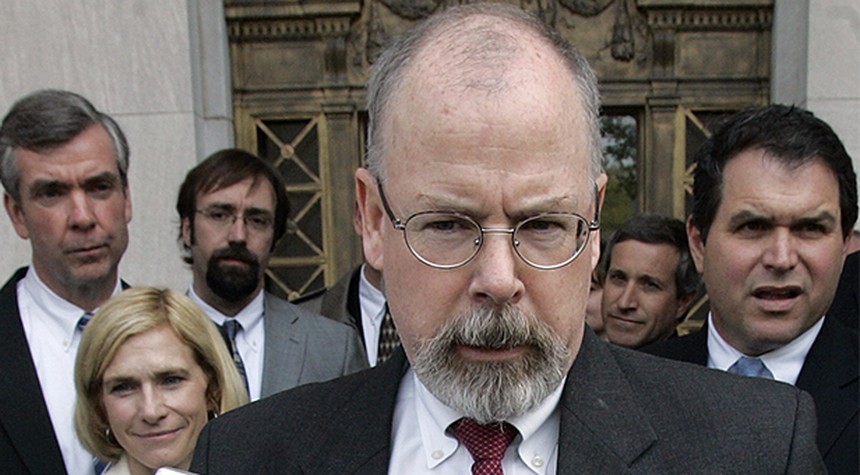Durham Rips Apart the Sussmann Motion to Dismiss and Lays out the Clinton Connection
I’m guessing someone didn’t like all the coverage of the Clinton connection to the Durham probe and the allegations in the Durham filing in the case against former Clinton campaign lawyer Michael Sussmann that revealed that servers connected to President Donald Trump were being surveilled for their DNS lookups.
After the news came out, the attorneys for Michael Sussmann moved to strike the factual background in the Durham filing that has raised all the furor, claiming essentially that Special Counsel John Durham said too much, and that the intent was “to politicize this case, inflame media coverage, and taint the jury pool.”
But then Sussmann’s attorneys moved to dismiss the entire case against him, basically arguing he didn’t say enough — that he didn’t state a case for the charge — and that Durham didn’t allege all the elements of the charge against him.
In the response to the first motion, Durham declared that there was “no basis” to strike any part of his filing, noting that the factual background was “central to proving” Sussmann’s “alleged criminal conduct.” Durham also noted that some of that was essential to laying out the potential conflicts that were the point of his Feb. 11 filing.
The thing about making such a motion is it doesn’t stand much of a chance, but unless it’s granted, it only tends to increase the stories that get written on the matter and increases the media. So, I’m not sure whoever was wanting this to go away is thinking clearly.
Now the Durham response to the motion to dismiss has been filed . The false statement that Sussmann is charged with making was that when he assembled all this information and conveyed it to the FBI, he allegedly falsely said he was not providing the information to the FBI on behalf of any clients, when he was doing it on behalf of Tech Exec-1 and the Clinton campaign, according to Durham.
The defense claimed the alleged lie told by Sussmann to the FBI wasn’t “material” as required under the charge.
I’m thinking it would be very material to the FBI, in terms of their decision whether to pursue the allegations, if they knew that the person providing the information was doing it on behalf of the Clinton campaign. That’s what Durham said in response, that it was capable of “influencing both the FBI’s decision to initiate an investigation and its subsequent conduct of that investigation.”
In contrast, the defendant made his false statement directly to the FBI General Counsel on a matter that was anything but ancillary: namely, the existence vel non of attorney-client relationships that would have shed critical light on the origins of the allegations at issue.
In other words, the alleged lie surrounded the very nature of the allegations themselves and who potentially might be behind them.
The defendant’s false statement to the FBI General Counsel was plainly material because it misled the General Counsel about, among other things, the critical fact that the defendant was disseminating highly explosive allegations about a then-Presidential candidate on behalf of two specific clients, one of which was the opposing Presidential campaign. The defendant’s efforts to mislead the FBI in this manner during the height of a Presidential election season plainly could have influenced the FBI’s decision-making in any number of ways. [….]
And the evidence will show that it would have been all the more material here because the defendant was providing this information on behalf of the Clinton Campaign less than two months prior to a hotly contested U.S. presidential election.
Durham then tapdanced all over their claim that somehow this might impact his Constitutional rights to free speech.
Far from finding himself in the vulnerable position of an ordinary person whose speech is likely to be chilled, the defendant – a sophisticated and well-connected lawyer – chose to bring politically-charged allegations to the FBI’s chief legal officer at the height of an election season. He then chose to lie about the clients who were behind those allegations. Using such rare access to the halls of power for the purposes of political deceit is hardly the type of speech that the Founders intended to protect.
In any event, Durham noted that it was up to the jury to decide whether it was “material” or not, so it’s not a subject for dismissal.
Legal translation? You guys are ridiculous with this argument.
I’m thinking the folks in Clinton-land aren’t going to like what’s coming next because this shouldn’t get dismissed. Plus, as former DNI John Ratcliffe explained, from the intel that he has seen and discussed with Durham, he expected “quite a few more indictments.” He also alleged that both Barack Obama and Joe Biden had been advised about the plan, and “everything that happened after that..is one of the reasons that John Durham is investigating.”
So, buckle up — there’s more to come.





Post a Comment